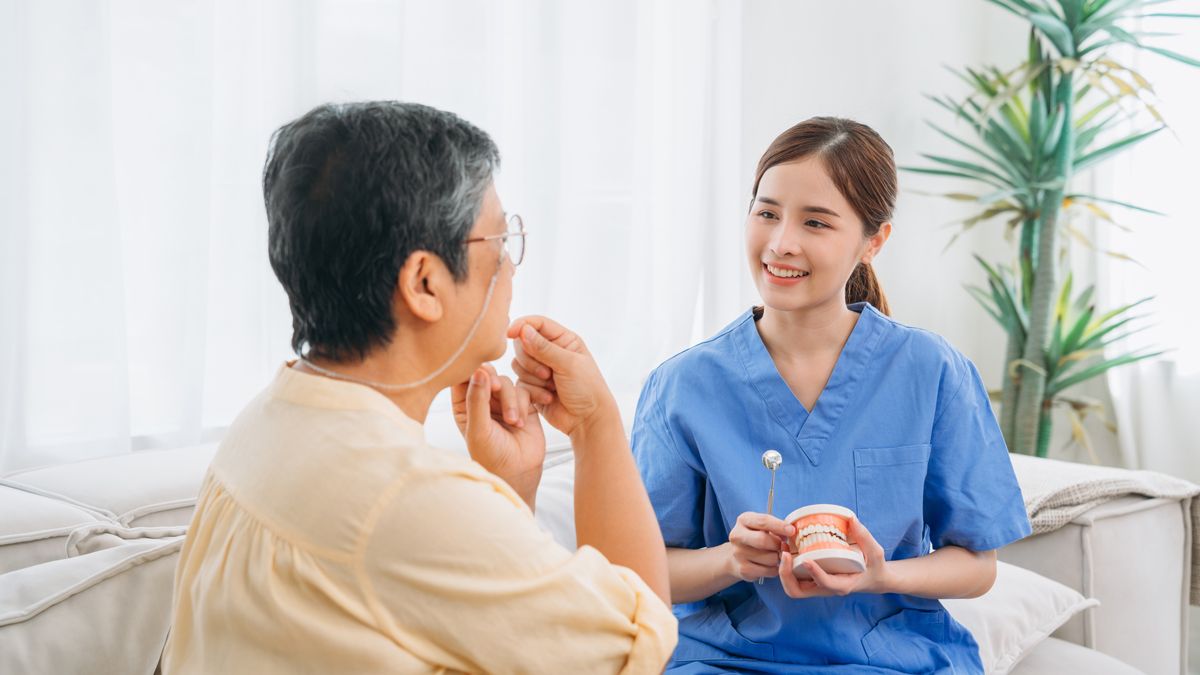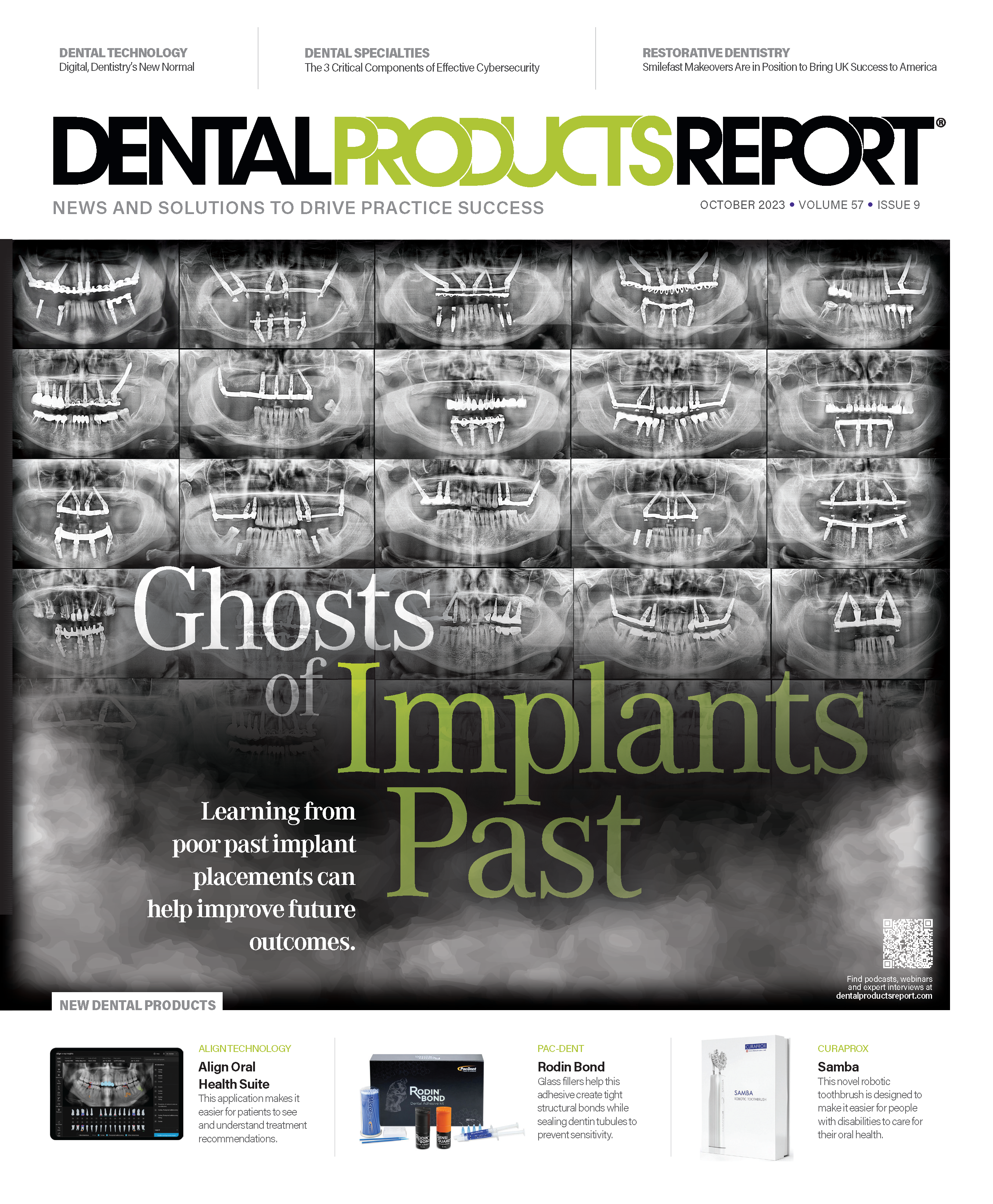How Do We Help Those Who Came Before Us?
Older generations deserve quality, dignified dental care. How can we ensure that they receive it?
How Do We Help Those Who Came Before Us? Image credit: © NewSaetiw - stock.adobe.com

An Awakening
My father’s health began to fail in 2017. However, the miracle that is our modern medical system managed to keep him alive for over 5 more years. As he deteriorated, I was forced to take an up-close and personal tour of what many of us may experience as we age.
At first it was assisted living, which is exactly what it sounds like. My dad was still mobile but needed some help with tasks like laundry, cleaning his little apartment, getting to the dining room, and things like that. Overall he just wasn’t as strong or as mobile as he once was. However, he fell and broke a couple of vertebrae. He was much less mobile and needed much more help. He then entered skilled nursing.
Skilled nursing is what I think most of us think of when we hear the term nursing home. It is basically 1 step above a hospital. I consider my father to be lucky. His mobility decreased, but he was still pretty sharp and pretty physically capable. Others in the facility were not so lucky.
I had to pass the nurses’ station on my way to my dad’s room and there were always about 10 residents arranged around the station in reclining wheelchairs. This group of patients stared off into space and many of them barely moved. The staff would get them out of bed, bathe them, dress them, and then bring them down to the nurses’ station so someone could always watch them and take care of them if they needed assistance.
There were many others who were mobile enough to walk and stroll around the facility, but many of them had greatly decreased mental capacity so they would walk, but they really couldn’t communicate. All exits were alarmed so that they couldn’t leave and get lost or injured.
The Struggle
During the COVID-19 nightmare, families weren’t allowed in the facility for months. I certainly understood the reasoning, but I wondered what those poor people with diminished mental capacity thought of never seeing loved ones and not understanding why.
After the COVID-19 lockdown, one day I was signing in at the front desk and I saw a clipboard with the word dentist at the top. I asked the young lady at the desk about it and was told it was the sign-up sheet. A mobile dental unit stopped by from time to time and if a resident wanted to be seen they could sign up.
That was a moment of stunned reality for me. I thought back to a former patient. This patient was about my age and began coming to see me after she moved to Kansas City, Missouri, to take care of her mom. I’ll call her Mrs P. Daughter P would always bring Mrs P with her and they would get their care at the same time. Mrs P was an amazingly sweet and lovable lady. She was always kind, always smiling, and always called her hygienist “Honey.”
One day Daughter P stopped by the office and asked to see me. Mrs P had been diagnosed with early Alzheimer disease and Daughter P wanted to know if I would still see her. She was relieved that I would.
Over the next few years the team and I watched Mrs P as her mental capacity declined rapidly. The last 2 years or so, whenever one of the hygienists would see her, she would swear at them. She would eventually be talked into having her teeth cleaned but she was often belligerent and sometimes threatened to punch one of the hygienists. My team chose to see her and take care of her. They knew it wasn’t the real Mrs P. The disease had changed her. One day as Daughter and Mrs P were leaving the office, Daughter P looked at me with tears in her eyes and said, “Dr Flucke, our medical profession is so good that people are living longer than they should.” Then she hugged me and sobbed.
Mrs P died shortly after that visit and when she did, her daughter moved away. On her last visit she thanked the entire team for all they had done for her and her mom.
Looking for Solutions
I often thought about Daughter and Mrs P as I spent time with my dad in the skilled nursing facility. I kept seeing the problem. However, I’m still struggling with the solution.
After COVID-19, skilled nursing suffered a staffing shortage. When you have a limited pool of employees, they can accomplish only a limited number of tasks. Oral health needs to be emphasized and taught as part of the training of those involved with care of older adults.
However, with limited staffing options I understand the problem. If you are responsible for 6 patients on your shift, you have to prioritize each patient’s needs. If you have the choice of brushing a patient’s teeth or changing a patient with soiled undergarments, I know which one takes priority. What we in dentistry need to do is to help figure out a solution to help eliminate those types of decisions.
There is no up without a down and along that line of thinking, I feel that one of the upsides to the COVID-19 crisis was the development of teledentistry.
I have been impressed with the app that connects my Philips Sonicare 9900 Prestige toothbrush to my iPhone. Perhaps there is something along those lines that tracks a patient’s brushing and then shares that data so it can be monitored. I’m thinking of having it connect to Wi-Fi and send the data to the nurses and to a dentist who visits the facility. Powered brushes have a diameter better suited to older hands with limited flexibility and the bristles just have to contact the tooth to provide cleaning since the “power” part of the brush does the work. For patients who are still able to provide their own care, this would be a great way to monitor their hygiene. The data could even be shared with family. If you know your mom hasn’t brushed her teeth in 48 hours you could call or stop by (if you live nearby) and find out what the problem is.
For patients who have limited mental and or physical capacity, we need more dental professionals who can visit these nursing centers and provide screening and/or care. I believe screening is the absolute minimum that we should be looking at in this scenario.
It would be great if we could have hygienists who could visit these centers. TeleDent from MouthWatch provides a system that can allow a hygienist to screen patients, take images, and record data that can be uploaded at the end of the day. A dentist can remotely review this information and then recommend treatment or travel to provide that treatment.
Wrapping Up
I realize this problem cannot be solved overnight. However, we owe a solution to those who came before us. The 2 biggest problems to overcome are staffing and money. The educational system needs to train more hygienists. To meet the needs of our older population we need to have full staffing in offices and enough trained professionals to also go into elder facilities. We also need more trained staff for these nursing facilities.
The second piece of this is where does the money come from? That is not something I have the answer to. The costs are not just for the staff. The hardware that allows data gathering also needs to be factored in. The good news is that initially the program could get off the ground with a few hand instruments, laptops, intraoral cameras, portable x-ray generators, and x-ray sensors.
What I’m discussing here isn’t a potential scenario. The problem exists. I have seen it. Every generation faces problems they must confront. We are living longer than ever before and we are the first generation that is really having to deal with the concerns of advanced age on a huge scale. This problem is here and it is only going to become bigger.
I often think about Daughter P and her thoughts about us living longer than we should. Our care needs to catch up to our life span. Right now our life span exceeds the care.
I want to close out this month’s column with a story about one of my dad’s caregivers. He was a young man, probably late 20s, maybe 30 at the most. I’m not sure where he grew up, but he was not native to the United States. He took really great care of my dad. He was always happy, always smiling, always upbeat to all of his patients. Dealing with older people can be trying and I saw some of the residents he treated being difficult, but he would always smile and joke with them, no matter what the situation.
I wanted him to know how much I valued and appreciated what he did for my dad. In the last couple of years my dad could be grumpy. In a quiet moment, I pulled him aside and told him how much I appreciated all he did.
“I want you to know how grateful I am for what you do,” I said. “Thank you for taking such good care of my dad.”
He looked at me and he positively glowed. He smiled widely and said, “It is my honor to take care of him.”
A more appropriate thing could not have been said. We owe quality of life to those who have come before us, and we should be honored to do so
